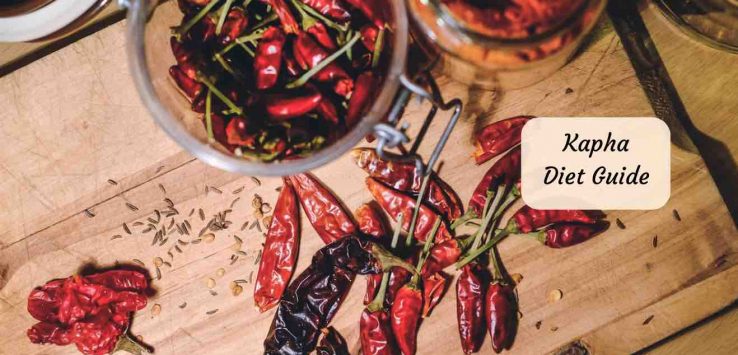

What does a Kapha diet contain? And what should Kapha folks eat less of? This diet guide for Kapha dosha tells you everything you need to know.
There are three doshas (mind-body types) in Ayurveda, namely Vata, Pitta, and Kapha. Composed of the earth and water elements, the Kapha dosha is the third. This dosha is slow, steady, cold, heavy, and oily. It governs structure, growth, density, and hydration.
If you are a Kapha type, you are likely to have thick hair and oily skin. You generally have good stamina. The Kapha body type is typically heavy. Patience, steadiness and calmness are common positive qualities of Kapha people.
Bitter foods are light and drying, which are the opposite qualities of Kapha and can therefore reduce it. Moreover, bitter foods are highly cleansing. They can effectively prevent Kapha skin problems like acne.
Pungent food is warming, rough as well as drying. The pungent taste is excellent for the Kapha dosha diet. It helps burn fat and stimulates the mind. Most spices work well for Kapha people.
Kapha is extremely moist and oily. This causes sluggishness, water retention, hormonal imbalance. But you can easily balance it by eating loads of dry foods. Most astringent foods work well.
Kapha is a rather heavy dosha. Many people with Kapha aggravation experience related problems like weight gain, lethargy, and depression. This is easily be taken care of with light foods.
It’s important to eat small quantities. Fasting from time to time benefits Kapha folks a whole lot.
Kapha is a cold dosha. So you can combat it with lots of warm food. An easy way to boost the heating qualities of your Kapha diet is with warming, pungent spices.
In general, you should limit everything opposite to the food mentioned earlier. This means reducing your intake of sweet, mild, heavy, moist, and cold food. Examples of these foods are:
Note: Posts on Ayurvedum are solely for the purpose of sharing the goodness of Ayurveda and bringing awareness about natural and healthy living. Please do not substitute it for professional medical advice. Ingredients discussed can interfere with certain medications. So, before using anything to treat yourself, always consult an Ayurveda doctor or practitioner.